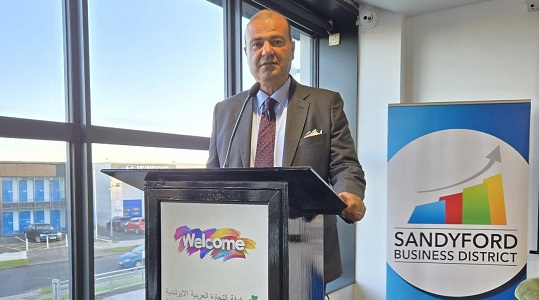Secretary-General of the Union of Arab Chambers, Dr. Khaled Hanafi, stressed during his speech at the Investment Promotion Conference in Arab Countries, which was held in the Irish capital, Dublin. The conference was organized by the Arab-Irish Chamber of Commerce and the Union of Arab Chambers and attended by the Irish Minister of International Development, Neale Richmond, the Mayor of Dublin, and politicians from the Republic of Ireland. In addition to the heads of companies from Ireland and the Arab world, the Secretary General of the Arab-Irish Chamber of Commerce, Ahmed Rakan Younes, and the Arab ambassadors accredited to Ireland, we are going through a critical stage in trade and investment on a global level.
“The Arab world and Europe have shared deep economic ties for decades, but the future potential is even greater,” the Secretary-General explained. “With a market of more than 450 million consumers, the Arab region is not just a major trading partner but is rapidly emerging as a hub for investment, innovation, and sustainable development. Therefore, Ireland, as a dynamic European economy and a leader in technology, finance, agribusiness, and renewable energy, is well placed to deepen its engagement with Arab markets.”
Dr. Khaled Hanafi said, “The Arab world is very diverse in its geographical reach, and it provides European companies with access to rapidly growing markets and possesses vast energy resources, in addition to great investment opportunities. The gross domestic product of the Middle East and North Africa region is also expected to reach $5 trillion by 2030, making it one of the most dynamic economic regions in the world. In contrast, trade between the European Union and the Arab world exceeded 300 billion euros in 2023, reflecting the strong interconnectedness between the two sides.”
The Secretary-General of the Union noted that “the Arab world has 48 percent of the world’s oil reserves and 43 percent of its natural gas reserves. The Arab region is also investing heavily in renewable energy, especially solar energy and hydrogen. The United Arab Emirates and Saudi Arabia have pledged to invest more than $300 billion in renewable energy projects, opening the door to European expertise in green technology, energy storage, and smart grids.”
He explained, “The Arab world is a major importer of food and agricultural products, and food imports are expected to reach $200 billion by 2030. Countries such as Saudi Arabia, the United Arab Emirates, and Egypt are also investing in sustainable agriculture, making Ireland’s expertise in dairy products, agricultural technology, and food processing of global value, as Ireland already exports more than 300 million euros of dairy and food products to the Middle East annually, and this number can grow through deeper cooperation.”
He said: “The Arab world is witnessing a boom in infrastructure projects globally, with planned projects worth more than $3 trillion in transportation, housing and smart city development. Meanwhile, European construction companies, engineering consultants and smart technology providers are well-placed to participate in these projects. In terms of technology and the digital economy, the size of the digital economy in the GCC countries is expected to reach $400 billion by 2030, with major investments in artificial intelligence, financial technology, and cybersecurity. Since European technology companies specializing in digital transformation, e-commerce, and data security are advanced in these fields, they have great opportunities to enter and invest in Arab markets.”
Dr. Khaled Hanafi explained, “The assets of sovereign wealth funds in the GCC countries exceed $3 trillion, with significant investments in real estate, technology, and infrastructure across Europe. The UAE, Saudi Arabia, and Qatar are among the largest Arab investors in European startups, energy projects, and financial markets. Arab investors are also increasingly interested in green finance, sustainable projects, and digital transformation in Europe. The European Union is the largest foreign investor in the Middle East and North Africa region, accounting for 30 percent of total foreign direct investment. Ireland and other European countries can benefit from these huge investment opportunities.”
The Secretary-General called for strengthening trade agreements and economic partnerships, considering that "although the European Union has multiple trade agreements with Arab countries, there is room for further liberalization, lowering customs tariffs and facilitating investment between the two sides, as free trade zones in the United Arab Emirates, the Kingdom of Saudi Arabia and Egypt provide business-friendly environments for European companies."
Dr. Khaled Hanafi called for “taking advantage of digital trade and e-commerce, as the growth of digital payments and financial technology solutions makes it easier for small and medium-sized enterprises and startups to engage in global markets. Cooperation in digital infrastructure, cybersecurity, and AI-based trade solutions can enhance the efficiency of trade between the two sides.”
He concluded by saying, “The Union of Arab Chambers stands ready to support companies seeking to enter and expand into the Arab world. We are committed to building stronger trade partnerships, facilitating investment flows, and opening up new economic opportunities.”
The Board of Directors of the Arab-Irish Chamber of Commerce held a meeting in the presence of the Chamber’s President Enda Corneille, Secretary-General of the Federation of Arab Chambers Dr. Khaled Hanafi, Secretary-General of the Arab-Irish Chamber of Commerce Ahmed Rakan Younes, and members of the Board of Directors from the Arab and Irish sides.
During the meeting, ways to enhance cooperation between the Arab and Irish sides were discussed, as well as ways to enhance the activity of the Arab-Irish Chamber of Commerce by organizing missions and holding meetings between businessmen, investors, and companies from the Arab and Irish sides.
The repercussions of the global trade war were also discussed after US President Donald Trump's decisions to impose large customs duties on many countries around the world. Warnings were given of the impact of this on the reality of global trade, the need to move away from protectionism, and to open common markets between Arab and European countries, most notably the Irish market.
Source (Union of Arab Chambers)

